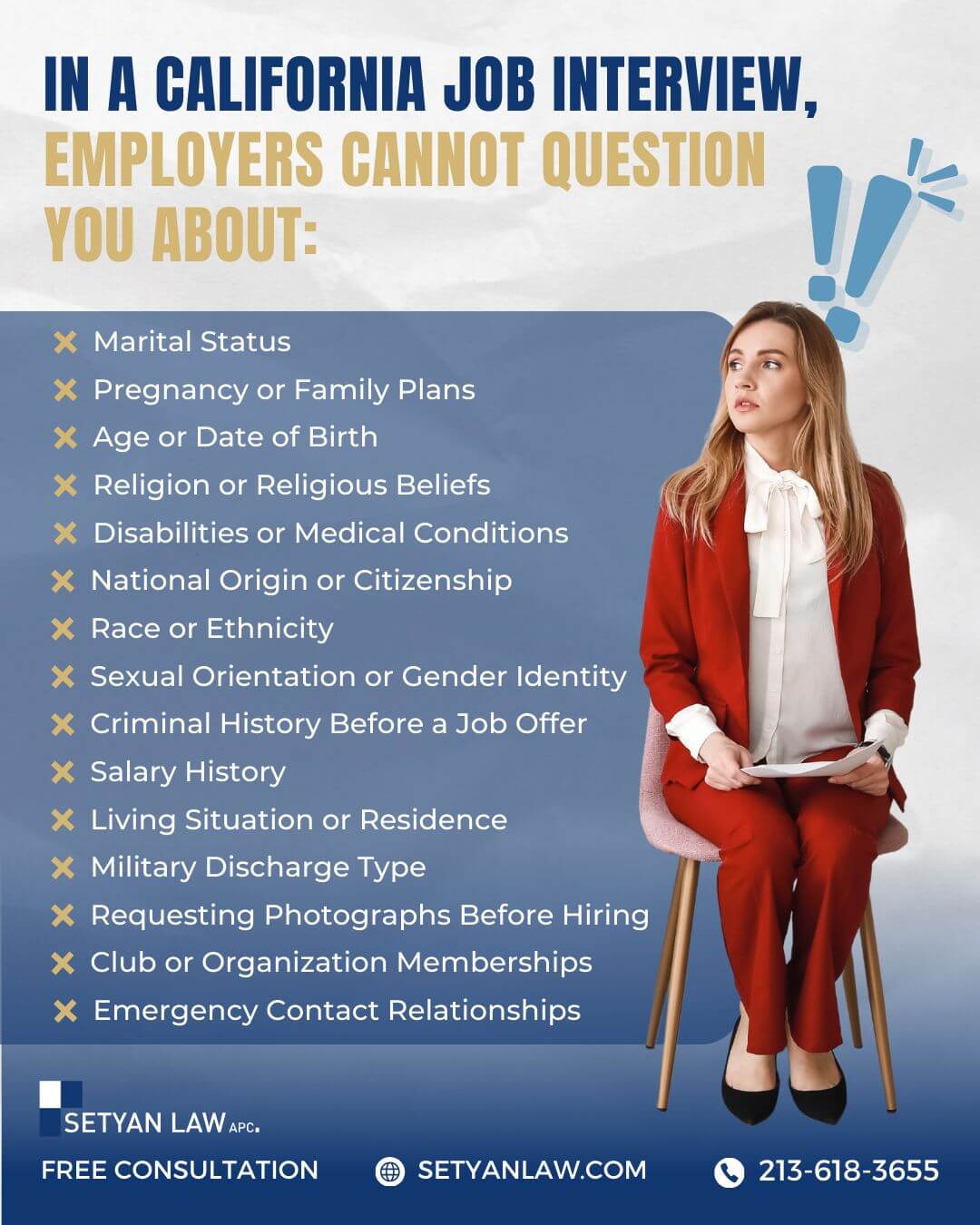Updated October 13, 2025
Interview Questions That Are Illegal to Ask in California
Ever wondered what questions are not allowed in an interview when you're applying for jobs in California? That uncomfortable moment when an interviewer asks about your marital status, age, or plans to have children isn't just awkward—it's likely illegal.
California has some of the strictest employment laws in the nation, protecting job applicants from discriminatory hiring practices. Unfortunately, many employers still cross these legal boundaries, often unintentionally. In fact, asking the wrong question during an interview can lead to serious legal consequences, including discrimination lawsuits and substantial penalties.
From inquiries about your religion to questions regarding your medical history, California law prohibits a wide range of personal questions that have no bearing on your ability to perform a job. Despite these protections, many job seekers remain unaware of their rights during the interview process.
This guide outlines 15 questions that California employers cannot legally ask during job interviews in 2025. Whether you're a job seeker wanting to know your rights or an employer aiming to maintain compliance, understanding these boundaries is essential for navigating the hiring process legally and ethically.
1. Asking About Marital Status
Questions about your marital status might seem innocuous, but they can reveal an employer's discriminatory intent. Marital status discrimination affects not only married or single individuals but also those who are divorced, engaged, or in same-sex marriages.
Why Asking About Marital Status is Illegal
Inquiries about whether you're married, engaged, or divorced often serve as a pretext for discrimination. These questions particularly disadvantage women, as employers might assume married or engaged women will become pregnant and take maternity leave [1]. Additionally, some companies hesitate to hire individuals in same-sex marriages due to personal biases [2].
The issue extends beyond direct questions about your marital status. Even seemingly casual congratulations about an engagement ring can be problematic. Consider this scenario: an interviewer notices your engagement ring and asks about your wedding date. Though appearing friendly, the interviewer might actually be screening you out based on assumptions about your future availability [3].
What Law Marital Status Questions Violate
In California, marital status is a protected class under the Fair Employment and Housing Act (FEHA) [3]. Consequently, employers cannot legally use an applicant's marital status as a factor in hiring decisions. At the federal level, such questions may violate Title VII of the Civil Rights Act of 1964, especially if they're used to deny employment opportunities [1].
Other prohibited pre-employment inquiries include questions about:
- Your spouse's name, age, religion, or birthplace
- Your pregnancy status or family planning intentions
- The employment status of your spouse
- Your spouse's credit history [3]
Acceptable Alternatives to Marital Status Questions
Employers can legally assess your ability to perform job duties without delving into marital status. Rather than asking personal questions, they may inquire about:
- Your availability to work required hours or travel
- Whether you can fulfill specific job requirements
- Your professional qualifications and experience
Furthermore, certain marital status information may be requested after a job offer has been extended and accepted, primarily for insurance or legitimate business purposes [1]. Nevertheless, during the interview stage, questions should remain focused exclusively on your qualifications and ability to perform the job.
2. Inquiring About Pregnancy or Family Plans
Pregnancy and family planning questions remain among the most common illegal inquiries during job interviews. Even questions asked casually can create significant legal exposure for employers in California.
Why Pregnancy Questions are Illegal
Questions about pregnancy or family planning often mask discriminatory hiring practices. Employers might avoid hiring women they believe will soon request maternity leave or need flexibility for childcare. Moreover, these questions have no relevance to a candidate's qualifications or ability to perform job duties.
Specifically, employers cannot ask:
- "Are you pregnant or planning to become pregnant?"
- "Do you have kids?"
- "Who will care for your children while you work?"
- "Will you be able to handle this job while pregnant?"
- "Are you planning to take time off soon?"
These questions create a hostile interview environment and may signal bias against women of childbearing age.
What Law Pregnancy Questions Violate
California offers some of the strongest workplace protections nationwide through the Fair Employment and Housing Act (FEHA), which explicitly prohibits discrimination based on pregnancy, childbirth, breastfeeding, or related medical conditions [4].
At the federal level, these questions violate:
Under these laws, employers cannot reject applicants based on current, future, or perceived pregnancy status. Hence, any question attempting to uncover this information is inherently discriminatory.
Acceptable Alternatives to Pregnancy Questions
Instead of inquiring about pregnancy or family plans, employers should focus on job-related qualifications. They may legally ask:
- About duration of stay on previous jobs (when asked of all candidates)
- About anticipated absences (without specifying pregnancy)
- Whether you can fulfill specific job requirements [7]
If faced with inappropriate questions, you can politely redirect the conversation back to your qualifications or simply state that you prefer to keep personal matters separate from your professional life [4].
3. Questions About Age or Date of Birth
Age-related questions often slip into interviews unnoticed, yet they represent a significant area of employment discrimination in California. These questions can lead to hiring biases, primarily affecting job seekers over 40.
Why Age Questions are Illegal
Asking about age during the hiring process can reveal an employer's discriminatory intent. Employers who inquire about your age or date of birth might use this information to:
- Screen out older applicants based on stereotypes about adaptability or technological skills
- Avoid hiring candidates they believe will retire soon
- Discriminate against younger workers for certain positions
Even seemingly innocent questions can reveal age information. For instance, asking about graduation years indirectly discloses age [8]. Likewise, online applications with age range drop-downs or cut-offs violate anti-discrimination laws [9].
What Law Age Questions Violate
California's Fair Employment and Housing Act (FEHA) explicitly prohibits age discrimination in hiring practices [8]. This law forbids both direct questions like "How old are you?" and indirect inquiries such as "What year did you graduate?" [8].
At the federal level, the Age Discrimination in Employment Act (ADEA) offers protection to workers 40 and older. This law applies to businesses with 20 or more employees [10], whereas California's FEHA provides broader coverage, applying to employers with five or more employees [10].
Acceptable Alternatives to Age Questions
Since employers cannot legally ask about age during interviews, they may instead:
- Verify that applicants meet any minimum age requirements for positions involving alcohol or hazardous conditions [8]
- Ask about relevant skills and experience rather than graduation dates
- Focus on capability to perform job functions
- Request age information after hiring for record-keeping purposes only [9]
Employers with legal reporting obligations, such as those with 100+ employees, may collect age information solely for record-keeping purposes [11]. However, this information should never influence hiring decisions.
4. Asking About Religion or Religious Beliefs
Inquiries about faith and religious practices represent a significant boundary in California interviews. Questions probing an applicant's religious beliefs can create uncomfortable situations and expose employers to serious legal liability.
Why Religion Questions are Illegal
Interview questions about religion often serve as proxies for discrimination. Employers might use information about an applicant's religious practices to:
- Make assumptions about availability for work on certain days
- Judge character based on stereotypes about specific faiths
- Discriminate against those whose religious practices require accommodations
Even seemingly innocent questions can cross legal boundaries. For example, asking about weekend availability might appear job-related, yet could be used to identify Sabbath observers. Similarly, inquiries about holidays an applicant celebrates can reveal religious affiliations.
What Law Religion Questions Violate
The California Fair Employment and Housing Act (FEHA) explicitly prohibits any non-job-related inquiries that directly or indirectly express limitation based on religious creed [1]. This protection extends beyond organized religions to include all sincerely held beliefs that occupy a place of importance parallel to traditional religions [12].
At the federal level, Title VII of the Civil Rights Act similarly protects applicants from religious discrimination, covering "all aspects of religious observance and practice, as well as belief" [13].
Notably, there exists a narrow exception: religious organizations may consider religion when hiring for positions where religious affiliation constitutes a bona fide occupational qualification [14]. This exemption applies exclusively to religious discrimination—not other protected characteristics like race or gender [14].
Acceptable Alternatives to Religion Questions
Instead of asking about religious beliefs, employers should:
- Clearly outline job requirements, including schedules, and ask if applicants can fulfill them
- Present the actual job duties without reference to religious holidays
- Inquire about professional qualifications and experience only
- If weekend work is genuinely required, ask about availability without mentioning religious observances [15]
According to federal guidelines, employers should avoid questions about an applicant's place of worship, days of worship, religious holidays, or requesting references from religious leaders [14].
5. Inquiring About Disabilities or Medical Conditions
Medical privacy remains a fundamental right even during job interviews. California employers who cross this line by asking about disabilities or health conditions face serious legal consequences.
Why Disability Questions are Illegal
Disability-related questions in interviews often lead to discrimination, as this information was historically used to exclude qualified candidates before their abilities were properly evaluated [16]. These inquiries create an uneven playing field and frequently result in prejudicial hiring decisions based on misconceptions rather than job qualifications.
Regarding what employers cannot ask, California law prohibits questions such as:
- "Do you have a disability?"
- "What medications are you currently taking?"
- "Have you ever filed for workers' compensation?"
- "Have you ever been treated for mental health issues?"
- "How many sick days did you take at your last job?" [17]
These questions intrude upon an applicant's medical privacy and typically have no legitimate connection to job performance.
What Law Disability Questions Violate
Disability inquiries primarily violate the California Fair Employment and Housing Act (FEHA), which explicitly prohibits employers from requiring medical examinations or making inquiries about an applicant's physical or mental disability prior to a job offer [1].
Additionally, these questions contravene the Americans with Disabilities Act (ADA), which protects applicants from discrimination throughout the hiring process [18]. Both laws aim to ensure that candidates are evaluated solely on their qualifications and abilities to perform essential job functions.
Acceptable Alternatives to Disability Questions
Employers can legally focus on job-related inquiries without crossing into protected territory. Prior to making an offer, they may:
- Ask about an applicant's ability to perform specific job functions with or without reasonable accommodation [19]
- Inquire if candidates can meet attendance requirements [20]
- Request demonstrations of job-related skills when these are required of all applicants
Following a conditional job offer, employers may conduct medical examinations or ask disability-related questions, provided these requirements apply equally to all candidates in the same job category [16].
6. Questions About National Origin or Citizenship
Many California employers inadvertently cross legal boundaries when asking about citizenship or national origin during interviews. These questions often create uncomfortable situations for applicants while exposing businesses to significant legal liability.
Why National Origin Questions are Illegal
Questions about national origin or citizenship status frequently mask discriminatory hiring practices. Employers cannot legally inquire about:
- Your birthplace or the birthplace of your parents, spouse, or relatives
- Your ancestry, lineage, or national origin
- How you acquired foreign language abilities
- Whether you're a U.S. citizen before making an employment offer
These inquiries typically have no legitimate connection to job qualifications yet create opportunities for bias. Even seemingly harmless questions like "Where were you born?" or "How long have you lived in the United States?" can be viewed as probing national origin – an illegal practice.
What Law National Origin Questions Violate
National origin inquiries primarily violate:
- The California Fair Employment and Housing Act (FEHA), which prohibits discrimination based on national origin, ancestry, and citizenship status
- Title VII of the Civil Rights Act, protecting applicants from employment discrimination based on national origin
- The Immigration Reform and Control Act (IRCA), which makes it illegal to discriminate regarding hiring or firing based on citizenship status
Furthermore, federal law prohibits employers from rejecting valid documentation or demanding additional documents beyond what's legally required for Form I-9 or E-Verify processes based on an employee's citizenship status or national origin. IRCA additionally prohibits retaliation against individuals who assert their rights under this law.
Acceptable Alternatives to National Origin Questions
Instead of problematic inquiries, employers may legitimately:
- Ask whether you have legal authorization to work in the United States (when asked of all applicants)
- Inquire about language abilities if genuinely relevant to job performance
- Evaluate communication skills during the interview without asking about native speaker status
In certain limited situations, employers can require English fluency if demonstrably necessary to perform the job effectively. Yet employers must never demand to see employment authorization documents prior to hiring or require U.S. citizenship except where mandated by law, regulation, or government contract.
7. Asking About Race or Ethnicity
Race and ethnicity questions remain off-limits in California job interviews, although they persist as one of the most common illegal inquiries. These questions typically have no legitimate connection to job qualifications yet create significant legal exposure for employers.
Why Race Questions are Illegal
California employers cannot legally inquire about an applicant's race or ethnicity during any phase of the hiring process. Even questions that indirectly reveal racial background violate anti-discrimination protections. Racial discrimination is prohibited in all employment practices, including advertisements, applications, interviews, hiring, promotions, and working conditions [21].
Subtle inquiries about an applicant's background can be equally problematic. Questions like "What language do you speak at home?" or "Where are your parents from?" often serve as thinly veiled attempts to determine racial or ethnic identity [22]. Telephone inquiries related to race are generally unjustified [23].
What Law Race Questions Violate
Race-based inquiries primarily violate:
- California Fair Employment and Housing Act (FEHA), which prohibits any non-job-related inquiries that directly or indirectly express limitation based on race, color, or ethnicity [1]
- Title VII of the Civil Rights Act, which prohibits discrimination based on race, color, and national origin
Both laws recognize that practices can be "fair in form, but discriminatory in operation" [21]. Significantly, the Supreme Court established in Griggs v. Duke Power Co. (1971) that employment practices operating as "built-in headwinds" for minority groups are illegal even without discriminatory intent [21].
Acceptable Alternatives to Race Questions
Presently, employers with legitimate data collection needs may:
- Collect race/ethnicity information after hiring for statistical reporting purposes [2]
- Provide clear explanations about why the information is being collected
- Make submissions voluntary and confidential
- Keep demographic information separate from application materials
For California employers with 100+ employees, collecting race data is required for pay data reporting. These employers should use self-identification methods whenever possible [2]. Although, whenever observer perception must be used, employers should document this accordingly.
8. Inquiring About Sexual Orientation or Gender Identity
California employment law explicitly prohibits employers from probing into applicants' sexual orientation or gender identity during interviews. These protections safeguard job seekers from uncomfortable or discriminatory questioning regardless of how the interviewer phrases such inquiries.
Why Sexual Orientation Questions are Illegal
Questions about sexual orientation or gender identity have no bearing on job qualifications yet can lead to discriminatory hiring decisions. Interviewers cannot legally ask candidates, either directly or indirectly, about their:
- Sexual orientation
- Gender identity or expression
- Plans for gender-affirming surgery
- Body or genitalia
- Sex assigned at birth
- Relationship status that might reveal orientation
Beyond explicit inquiries, even subtle questions can cross legal boundaries. For instance, asking about a candidate's spouse's name or the relationships between household members constitutes indirect probing into protected characteristics.
Importantly, protection extends even to cases of mistaken perception. California law shields applicants from discrimination based on both actual and perceived sexual orientation or gender identity [24]. Therefore, even if an employer misunderstands your identity, they remain legally prohibited from discriminatory actions.
What Law Sexual Orientation Questions Violate
These inquiries primarily violate the California Fair Employment and Housing Act (FEHA), which prohibits discrimination based on sexual orientation, gender identity, and gender expression [25]. Additionally, the California Constitution protects individuals from intrusive questions unrelated to work requirements [26].
FEHA specifically bans any non-job-related inquiries that express limitation or discrimination based on sexual orientation, either directly or indirectly [25]. This comprehensive protection covers the entire hiring process.
Acceptable Alternatives to Sexual Orientation Questions
In lieu of inappropriate personal inquiries, employers should:
- Focus exclusively on professional qualifications
- Ask about employment history and references
- Discuss skills relevant to job performance
- Inquire about availability to work required hours
The only circumstance where personal questions might be permissible is when an employer has a legitimate business reason that outweighs the applicant's privacy interest [26]. Such exceptions are exceedingly rare and must be carefully evaluated for necessity.
9. Questions About Criminal History Before a Job Offer
The "ban the box" movement has transformed hiring practices throughout California, prohibiting employers from asking about criminal history until later in the hiring process. Job seekers formerly excluded based on past mistakes now receive fair consideration for their qualifications first.
Why Criminal History Questions are Illegal
Pre-employment criminal history inquiries create unnecessary barriers for qualified candidates. These questions predominantly impact communities already facing employment challenges. Presently, employers cannot:
- Include criminal history questions on job applications
- Ask about criminal records during interviews
- Conduct criminal background checks before making a conditional job offer
- Include statements like "No Felons" or "Must Have Clean Record" in job postings
Importantly, even if you voluntarily disclose your criminal history before receiving a conditional offer, employers cannot legally consider this information in their hiring decisions [27].
What Law Criminal History Questions Violate
These prohibitions stem from the California Fair Chance Act (FCA), commonly known as the "Ban the Box" law, which became effective January 1, 2018 [28]. The law applies to both public and private employers with five or more employees [3].
The FCA specifically prohibits employers from inquiring about criminal history through any means—including internet searches, application forms, or interview questions—until after extending a conditional job offer [27].
Certain exceptions exist for positions where:
- State or local agencies must conduct criminal background checks by law
- Criminal justice agencies are hiring
- Farm labor contractors are recruiting
- Laws require employers to restrict employment based on criminal history [29]
Acceptable Alternatives to Criminal History Questions
Instead of criminal history questions, employers should:
- Focus exclusively on qualifications, experience, and skills during initial screening
- Evaluate candidates based on merit before conducting background checks
- Make conditional job offers before requesting criminal history information
After making a conditional offer, employers can conduct background checks but must perform an individualized assessment considering factors such as offense seriousness, time elapsed, and job relevance [29]. Employers must notify candidates in writing if withdrawing an offer based on criminal history [3].
10. Asking About Salary History
In 2018, California joined other progressive states by prohibiting employers from asking job applicants about their salary history. This groundbreaking legislation aims to break the cycle of pay discrimination and ensure fair compensation based on qualifications rather than past earnings.
Why Salary History Questions are Illegal
Salary history inquiries perpetuate existing wage gaps, particularly affecting women and minorities who historically receive lower compensation. When employers base new offers on previous salaries, pay inequalities follow workers throughout their careers. Under current California regulations, employers cannot:
- Ask about your salary history verbally or in writing
- Inquire about current compensation
- Request information about previous benefits packages
- Seek this information through recruiters or agents
- Use salary history to determine whether to extend a job offer
This prohibition applies to all California employers, including state and local government entities. The law recognizes that past salaries may reflect discrimination rather than merit or market value.
What Law Salary History Questions Violate
These prohibitions stem primarily from Labor Code Section 432.3, effective January 1, 2018, through Assembly Bill 168. Subsequently, clarifying amendments were added in July 2018. This legislation explicitly forbids employers from:
- Seeking salary history information about applicants personally or through agents
- Relying on salary history information to determine whether to offer employment
- Using previous compensation as the sole factor in setting new salary
The law simultaneously works alongside California's Fair Pay Act (Labor Code Section 1197.5), which states that "prior salary shall not justify any disparity in compensation" between employees performing substantially similar work.
Acceptable Alternatives to Salary History Questions
Fortunately, employers can still gather necessary information without violating the law. They may:
- Ask about your salary expectations for the position
- Provide the pay scale for the position upon reasonable request
- Discuss the approved salary range for the role
- Consider voluntarily disclosed salary history as one factor (among others) in determining compensation
Importantly, after extending a job offer, employers may verify salary history with previous employers, provided they have written authorization from the candidate. Given these restrictions, many California employers now include salary ranges in job postings to facilitate more transparent compensation discussions.
11. Inquiring About Living Situation or Residence
Housing-related questions can create unexpected legal issues during the hiring process. Even innocuous-sounding inquiries about where a candidate lives or their housing arrangements could expose California employers to discrimination claims.
Why Residence Questions are Illegal
Questions about an applicant's living situation often serve as proxies for obtaining information about protected characteristics. Interviewers who ask whether you rent or own your home might be attempting to determine your economic status or stability. Likewise, inquiries about your neighborhood or how long you've lived in California potentially extract information about your national origin or ancestry.
Some examples of prohibited residence questions include:
- "Do you rent or own your home?"
- "What neighborhood do you live in?"
- "How long have you lived in California or the United States?"
- "Who do you live with?"
These questions typically have no legitimate connection to job performance yet may reveal information about protected classes. Interestingly, even questions about an applicant's parents' occupations or details about their living arrangements are forbidden under California employment law.
What Law Residence Questions Violate
These inquiries primarily violate the California Fair Employment and Housing Act (FEHA), which explicitly prohibits any non-job-related inquiries that express discrimination based on protected characteristics. FEHA specifically forbids questions regarding "owning or renting" and inquiries about "nationality, lineage, ancestry, national origin, descent or parentage of applicant, applicant's spouse, parent or relative."
Furthermore, asking how long someone has lived in California or the United States might be interpreted as inquiring about national origin, which is prohibited under both FEHA and federal anti-discrimination laws.
Acceptable Alternatives to Residence Questions
Instead of problematic residence inquiries, employers may:
- Ask if candidates can reliably commute to the workplace location
- Inquire whether applicants are legally authorized to work in the United States
- Request emergency contact information after hiring
- Focus exclusively on job-related qualifications during interviews
Through maintaining focus on legitimate job requirements, employers can gather necessary information without crossing into legally protected territory.
12. Questions About Military Discharge Type
Military discharge status remains a sensitive topic that many interviewers mishandle. Veterans often face inappropriate questions about their service exit conditions, creating both personal discomfort and legal exposure for employers.
Why Military Discharge Questions are Illegal
Asking veterans to reveal the nature of their military discharge crosses important privacy boundaries. Initially, these inquiries may seem relevant for background checks, yet they create several legal problems. Questions about discharge type may inadvertently uncover protected medical disability information, potentially violating disability protection laws. Moreover, military discharge questions occasionally result in disparate impact based on race, further compounding discrimination concerns.
The privacy standard is straightforward: requesting information about discharge characterization is considered private—essentially equivalent to asking someone about their disability type. This information is not readily available to employers during pre-employment screening and requires explicit permission to access.
What Law Military Discharge Questions Violate
These inquiries primarily conflict with the Uniformed Services Employment and Reemployment Rights Act (USERRA), which prohibits discrimination regarding military service. Under USERRA, employers cannot ask about discharge type unless they can demonstrate a "bona fide occupational qualification" (BFOQ)—rare exceptions primarily limited to state job veteran preferences or security clearance positions.
Regarding California law, military status-based discrimination protections extend to veterans, making discharge status questions problematic. Additionally, these questions may violate the Americans with Disabilities Act when they reveal disability information.
Acceptable Alternatives to Military Discharge Questions
Employers can obtain valuable information without crossing legal boundaries by:
- Focusing on skills, qualifications, and experience gained during military service
- Inquiring about education, training, or work experience in the armed forces
- Asking about dates of service, duties performed, rank, and training received
Altogether, employers should redirect their inquiries toward job-related qualifications rather than discharge specifics. When verification is absolutely necessary, obtaining written permission and considering "favorable" discharge status (encompassing both honorable and general under honorable conditions) offers a more legally sound approach.
13. Requesting Photographs Before Hiring
Photo requests during the job application process create serious legal risks for California employers. Unlike some questions that might seem harmless, requiring photographs before hiring directly enables appearance-based discrimination.
Why Pre-Hire Photo Requests are Illegal
Requesting photos from job applicants potentially enables discrimination based on several protected characteristics:
- Race, ethnicity, or skin color might become visible
- Age can be estimated from appearance
- Gender or gender expression becomes apparent
- Visible disabilities might be revealed
- Weight, height, or general appearance could influence decisions
For most positions, physical appearance has no relevance to job qualifications [30]. Importantly, industries where appearance plays a genuine role in recruitment may qualify for limited exemptions under specific circumstances
What Law Photo Requests Violate
Pre-employment photo requests primarily violate California's Fair Employment and Housing Act regulations, which explicitly forbid employers from requiring photographs before hiring [31]. At the federal level, the Equal Employment Opportunity Commission (EEOC) advises against requesting photographs, as this practice potentially reveals protected characteristics irrelevant to job qualifications [32].
The request itself might not technically be illegal in all circumstances—but using photos to make discriminatory hiring decisions definitely violates anti-discrimination laws [33]. This creates a gray area where employers requesting photos expose themselves to potential discrimination claims, regardless of their intent.
Acceptable Alternatives to Photo Requests
Instead of requesting photographs during the hiring process, employers should:
- Focus exclusively on job-related qualifications and experience
- Conduct structured interviews based on skill assessment
- Implement blind resume reviews to reduce unconscious bias
- Request photographs only after extending a job offer, if needed for identification purposes [32]
Ultimately, photographs should only be required post-employment when legitimately necessary [1]. Job seekers facing photo requests should consider politely questioning the relevance to the position—this approach might subtly remind employers about potential discrimination issues while providing clarity about the request's purpose [30].
14. Asking About Club or Organization Memberships
Club and organization memberships often reveal more about candidates than employers legally need to know. Membership inquiries remain problematic throughout the hiring process, potentially exposing personal affiliations that bear no relation to job qualifications.
Why Organization Questions are Illegal
Asking about organizational memberships typically enables discrimination based on protected characteristics. Questions like "What clubs do you belong to?" might seem conversational but can expose religious affiliations, political leanings, or ethnic associations. Concerning diversity issues, these inquiries create opportunities for bias in hiring decisions.
According to the California Department of Fair Employment and Housing Act (FEHA), employers are prohibited from inquiring about various subjects that might reveal protected characteristics. Fundamentally, membership questions serve no legitimate purpose in assessing job qualifications for most positions.
Beyond direct discrimination, these questions create uncomfortable situations for candidates who must decide whether to disclose potentially sensitive affiliations.
What Law Organization Questions Violate
These inquiries predominantly violate California's Fair Employment and Housing Act, which explicitly prohibits any non-job-related questions that might directly or indirectly express limitation based on protected characteristics.
Regarding legal interpretations, general questions about "organizations, clubs, societies and lodges" are considered inappropriate during pre-employment screening. Currently, 20% of hiring managers still ask off-limits questions during interviews, exposing their companies to potential discrimination claims.
Acceptable Alternatives to Organization Questions
Instead of broad inquiries about organizational memberships, employers may:
- Request lists of job-related organizations or professional societies only, explicitly stating candidates may omit those indicating race, religious affiliation, national origin, ancestry, gender, or age
- Focus exclusively on professional certifications and industry-specific affiliations relevant to the position
- Ask about specific skills developed through professional activities without probing organizational affiliations
Ultimately, employers should maintain their focus on qualifications and abilities rather than affiliations that could reveal protected characteristics.
15. Inquiring About Emergency Contact Relationships
Emergency contact forms typically arrive after you've been hired, yet questions about relationships to emergency contacts during interviews can cross into legally protected territory. These seemingly practical inquiries often reveal personal information unrelated to your qualifications.
Why Emergency Contact Relationship Questions are Illegal
Questions about your emergency contacts' relationships to you can inadvertently disclose protected characteristics. When interviewers ask "Who would be your emergency contact?" followed by "What's your relationship to them?" they may uncover:
- Marital status (if listing a spouse)
- Family structure or living arrangements
- Sexual orientation (through partner relationships)
- Religious affiliations (through certain relationships)
In essence, these questions provide no insight into job qualifications yet potentially reveal personal information employers cannot legally consider when making hiring decisions.
Admittedly, employers need emergency contact information for legitimate safety purposes. Nevertheless, this information should only be collected after making a hiring decision, never during interviews or on application forms.
What Law Emergency Contact Questions Violate
These inquiries potentially violate California's Fair Employment and Housing Act (FEHA). The law specifically notes that inquiries, even those neutral on their face, which adversely impact persons based on protected characteristics are "permissible only if sufficiently related to an essential job function" [1].
Under these circumstances, asking about emergency contact relationships during pre-employment screening creates discrimination risk without serving any essential job function.
Acceptable Alternatives to Emergency Contact Questions
Employers can gather necessary information without crossing legal boundaries by:
- Waiting until after hiring to request emergency contact information
- Separating relationship questions from emergency contact forms
- Using neutral language on forms requesting "Name and address of person to be notified in case of accident or emergency" [1]
- Allowing employees to designate anyone without specifying relationships
Fundamentally, while employers need emergency contacts for safety purposes, this information becomes relevant only after employment begins. During interviews, focus should remain exclusively on job-related qualifications.
To this end, candidates encountering these questions might politely redirect the conversation back to their professional qualifications or note they'd be happy to provide emergency contacts after receiving an offer.
Conclusion
Navigating job interviews successfully requires understanding your rights as an applicant and recognizing illegal questions when they arise. California employment laws stand among the nation's most comprehensive, offering significant protections against discriminatory hiring practices. These regulations protect candidates from questions about marital status, pregnancy plans, age, religion, disabilities, national origin, race, sexual orientation, criminal history, salary history, living situation, military discharge, and organizational memberships.
Job seekers facing inappropriate questions during interviews have several options. Politely redirecting the conversation back to your qualifications often works effectively. Alternatively, you might acknowledge the question while providing only job-relevant information. Remember, illegal questions typically reveal information employers cannot legally consider when making hiring decisions.
Employers must likewise understand these legal boundaries. Focusing exclusively on job-related qualifications not only ensures compliance but also creates a more equitable hiring process. Questions should assess candidates' abilities to perform essential job functions without venturing into protected personal territories.
Knowledge empowers both sides of the interview table. Job candidates equipped with awareness of illegal questions can better protect their rights, while employers who understand these limitations can develop fair hiring practices that evaluate candidates based solely on merit. Through maintaining focus on qualifications rather than personal characteristics, the hiring process becomes both more legally compliant and fundamentally fair.
Call Setyan Law at (213)-618-3655 to schedule a free consultation.








